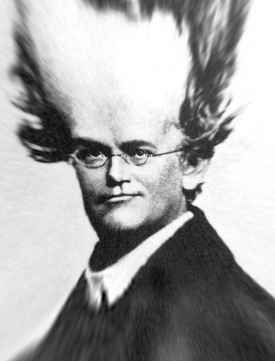Famous Biologists
Biology is the study of life and living organisms, and focuses
on the growth, evolution, structure, composition, and function
of those organisms. Modern biology has a variety of subfields
of study, and although it has broad reaches, there are specific
identifying concepts that tie all research and study in the field
into one cohesive science.
|
|
 Gregor Mendel
Gregor Mendel |
Throughout history, the field has given way to numerous important
discoveries that helped shaped life as we know it today. There
are many famous biologists whose work has greatly impacted our
understanding of the science.
Charles Darwin is mostly known
for his theory of evolution in which he proposed the concept of
natural selection and survival of the fittest. Darwin did a large
amount of research in the Galapagos Islands, and was considered
a naturalist. His education at the University of Cambridge led
to his study of medicine at University of Edinburgh in Scotland.
He believed that all life, regardless of species came from one
single source.
If you've ever wondered where your
baby got his eyes, or why your sister can wiggle
her nose and you can't, you can find the answers in the research
of Gregor Mendel. Modern genetics are based off Mendel's work,
which all began with a couple of peas. He wrote "Experiments
on Plant Hybridization" and found various methods for cross
breeding and studying specific traits in peas. The findings that
one trait remains dominant throughout a breeding line is called
the Mendelian inheritance.
Our modern classification system of various organisms is derived
from a system put in place by Aristotle. While many known his
name, very few associate his work with biology. Yet his effect
on the classification of living things was apparent up into the
19th century. Aristotle's system was simple, based on the different
ways he saw life: "With blood, without blood, etc."

Charles Darwin
There's a pretty big chance your
doctor has sworn to practice medicine according
to the principles of the Hippocratic Oath. This oath is named
for the Father of Western Medicine, Hippocrates. He was the first
scientist to determine that diseases were not an act of the Gods,
and instead could be attributed to natural causes. Also, he was
known for his professional discipline in the field of medicine,
which set a standard for doctors still today.
The world would be a much different place if it weren't for Edward
Jenner, the man who created the first vaccine for smallpox. Considered
the Father of Immunology, Jenner's work in microbiology made him
a pioneer in his field.
In the field of microbiology, another important discovery was
the process of pasteurization, discovered by none other than its
namesake, Louis Pasteur. His
background in chemistry and microbiology helped his success, and
his discovery of germ theory was the starting point for his research.
Next time you drink a bacteria free glass of milk or wine, you
can thank Louis Pasteur.
Rumor Has It …
… that Pasteur was also a secret homogenizer who not only pollenated
whenever he could but also hydrogenated as well.
Written by Kevin Lepton
|

